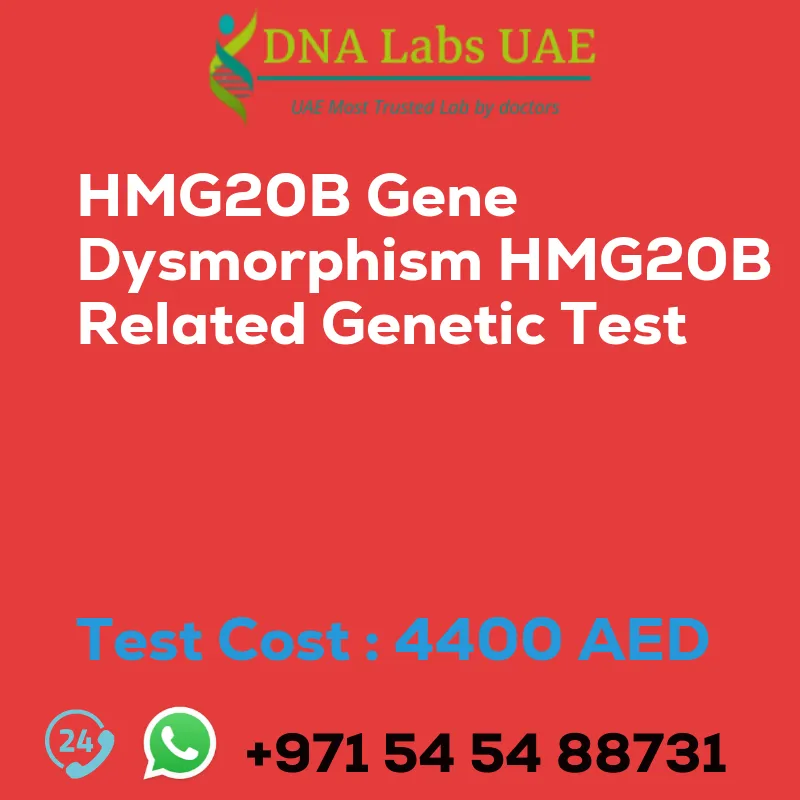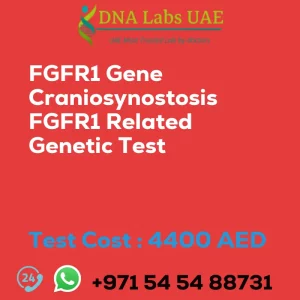HMG20B Gene Dysmorphism – Genetic Test
Cost: AED 4400.0
Test Name: HMG20B Gene Dysmorphism – HMG20B related Genetic Test
Components: Blood or Extracted DNA or One drop Blood on FTA Card
Report Delivery: 3 to 4 Weeks
Method: NGS Technology
Test Type: Dysmorphology
Doctor: Pediatrics
Test Department: Genetics
Pre Test Information: Clinical History of Patient who is going for HMG20B Gene Dysmorphism, HMG20B related NGS Genetic DNA Test. A Genetic Counselling session to draw a pedigree chart of family members affected with HMG20B Gene Dysmorphism, HMG20B related NGS Genetic DNA Test gene HMG20B
Test Details
HMG20B gene dysmorphism refers to any variation or mutation in the HMG20B gene, which encodes for the High Mobility Group 20B protein. This protein is involved in regulating gene expression and chromatin structure, playing a crucial role in various cellular processes.
NGS (Next-Generation Sequencing) genetic testing is a powerful tool used to analyze and identify genetic variations or mutations in an individual’s DNA. In the context of HMG20B, NGS genetic testing can be used to detect and characterize any dysmorphism or mutation in the HMG20B gene.
NGS genetic testing involves sequencing the DNA of an individual using advanced sequencing technologies. This allows for the identification of specific genetic variations or mutations, including those in the HMG20B gene. By analyzing the genetic information, NGS testing can provide valuable insights into an individual’s genetic makeup and potential disease risks associated with HMG20B dysmorphism.
NGS genetic testing for HMG20B dysmorphism can be useful in several scenarios, including:
- Diagnostic purposes: Identifying specific genetic variations or mutations in the HMG20B gene that may be associated with certain diseases or conditions.
- Prognostic purposes: Predicting the likelihood of developing certain diseases or conditions based on the presence of specific HMG20B gene dysmorphism.
- Therapeutic purposes: Guiding personalized treatment plans based on an individual’s genetic profile, including potential drug response or resistance.
- Research purposes: Studying the role of HMG20B gene dysmorphism in the development and progression of various diseases or conditions.
It is important to note that NGS genetic testing should be performed and interpreted by qualified healthcare professionals or genetic counselors who can provide appropriate guidance and counseling based on the results.
| Test Name | HMG20B Gene Dysmorphism HMG20B related Genetic Test |
|---|---|
| Components | |
| Price | 4400.0 AED |
| Sample Condition | Blood or Extracted DNA or One drop Blood on FTA Card |
| Report Delivery | 3 to 4 Weeks |
| Method | NGS Technology |
| Test type | Dysmorphology |
| Doctor | Pediatrics |
| Test Department: | Genetics |
| Pre Test Information | Clinical History of Patient who is going for HMG20B Gene Dysmorphism, HMG20B related NGS Genetic DNA Test. A Genetic Counselling session to draw a pedigree chart of family members affected with HMG20B Gene Dysmorphism, HMG20B related NGS Genetic DNA Test gene HMG20B |
| Test Details |
HMG20B gene dysmorphism refers to any variation or mutation in the HMG20B gene, which encodes for the High Mobility Group 20B protein. This protein is involved in regulating gene expression and chromatin structure, playing a crucial role in various cellular processes. NGS (Next-Generation Sequencing) genetic testing is a powerful tool used to analyze and identify genetic variations or mutations in an individual’s DNA. In the context of HMG20B, NGS genetic testing can be used to detect and characterize any dysmorphism or mutation in the HMG20B gene. NGS genetic testing involves sequencing the DNA of an individual using advanced sequencing technologies. This allows for the identification of specific genetic variations or mutations, including those in the HMG20B gene. By analyzing the genetic information, NGS testing can provide valuable insights into an individual’s genetic makeup and potential disease risks associated with HMG20B dysmorphism. NGS genetic testing for HMG20B dysmorphism can be useful in several scenarios, including: 1. Diagnostic purposes: Identifying specific genetic variations or mutations in the HMG20B gene that may be associated with certain diseases or conditions. 2. Prognostic purposes: Predicting the likelihood of developing certain diseases or conditions based on the presence of specific HMG20B gene dysmorphism. 3. Therapeutic purposes: Guiding personalized treatment plans based on an individual’s genetic profile, including potential drug response or resistance. 4. Research purposes: Studying the role of HMG20B gene dysmorphism in the development and progression of various diseases or conditions. It is important to note that NGS genetic testing should be performed and interpreted by qualified healthcare professionals or genetic counselors who can provide appropriate guidance and counseling based on the results. |








